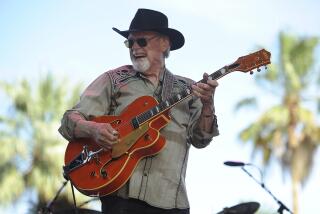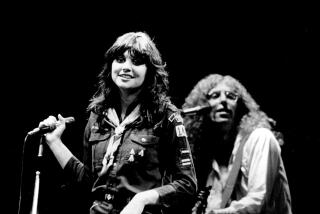Appreciation: Remembering Daevid Allen, co-founder of Soft Machine and Gong
- Share via
Daevid Allen, the influential poet, musician and iconoclast best known for co-founding avant-rock bands the Soft Machine and Gong, has died, according to an announcement on his Facebook page. Allen, 77, died after complications from cancer.
The artist, who cut a wide swath through 1960s and ‘70s Europe traveling in post-Beat era circles and produced volumes of music, was responsible for so much curiously inventive work that his travels read like a history of late 20th century European musical avant-garde.
Allen helped discover a then-16-year-old British singer Robert Wyatt, collaborated or befriended artists including fellow Soft Machine mates Kevin Ayers and Mike Ratledge, minimalist composer Terry Riley, jazz trumpeter Don Cherry as well as writers William Burroughs and Robert Graves. Allen’s longtime collaborator and partner Gilli Smyth played the voice behind the curtain in the Jane Fonda sci-fi classic “Barbarella,” and Allen helped collaborate on the score.
Allen, though, is best known for the Soft Machine and Gong. The former, formed in 1966 by Allen, Wyatt, Ayers and Ratledge, was the artist’s musical springboard, and he worked on their post-British Invasion singles in 1966-67. But after visa problems prevented him from reentering England, the Australian-born artist settled in Paris, where he founded Gong. It was a whole different brand of music.
In doing so, Allen spawned a decades-long project featuring multi-album conceptual narratives, merging free jazz, British folk music and tripped-out post-Frank Zappa excursions that were so musically inclusive that thay often bordered on schizophrenia. Forty years later, some of the stuff sounds ridiculously dated – “Flying Teacup,” for example, is absurd.
But at their best, tracks connect dots between rock, funk and improvised avant-jazz in a way that feels one Kanye West sample away from renewed vitality. Which is to say, West heard in King Crimson’s “20th Century Schizoid Man” an intense riff buried in an odd place; Gong songs are filled with such intense strangeness.
Despite learning of his cancer in 2014, Allen continued performing and reading poetry with a drive of someone half his age. In early February, he announced that his cancer had spread, and that his days were numbered. Allen acknowledged his mortality with a typically lyrical farewell, writing on the Gong site, in part:
“I can only hope that during this journey, I have somehow contributed to the happiness in the lives of a few other fellow humans. I believe I have done my best to heal, dear friends and that you have been enormously helpful in supporting me through this time. So Thank you SO much for being there with me, for the Ocean of Love.”
On March 3 during a tribute reading in Western Australia, Allen, looking frail, read a selection from Kahlil Gibran. He seemed to understand that this was his last public performance.
For what is it to die but to stand naked in the wind and to melt into the sun?
And what is it to cease breathing but to free the breath from its restless tides, that it may rise and expand and seek God unencumbered?
Only when you drink from the river of silence shall you indeed sing.
And when you have reached the mountaintop, then you shall begin to climb.
And when the earth shall claim your limbs, then shall you truly dance.
Looking for music tips? Follow Randall Roberts on Twitter: @liledit
More to Read
The biggest entertainment stories
Get our big stories about Hollywood, film, television, music, arts, culture and more right in your inbox as soon as they publish.
You may occasionally receive promotional content from the Los Angeles Times.










